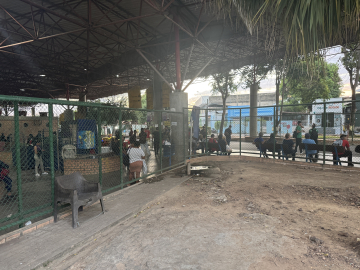Ending Impunity for Attacks on Health Care: Q&A with Leonard S. Rubenstein
Intense violence against health workers persisted in 2016—and accountability for the attacks remains inadequate or non-existent, according to a new report released today by the Safeguarding Health in Conflict Coalition. Released to mark the 1-year anniversary of the UN Security Council’s adoption of Resolution 2286, which aimed to protect health in conflict, Impunity Must End documents attacks on health care in 23 countries.
The attacks have been horrific, including:
- 108 verified attacks on health facilities, and the deaths of 91 health professionals in Syria in 2016, reported by Physicians for Human Rights
- 93 attacks on hospitals in Yemen verified by Unicef from March 2015-December 2016
- More than 100 attacks in Afghanistan, including 13 attacks on vaccinators, reported by Watchlist on Children in Armed Conflict
- 416 instances of violence or interference with ambulances, injuring 162 emergency medical technicians, in the Occupied Palestinian Territory, according to the Palestinian Red Crescent Society
“Our findings cry out for a level of commitment and follow-through by the international community and individual governments that has been absent since the passage of Security Council Resolution 2286 a year ago,” said Leonard S. Rubenstein, Director of the Program on Human Rights, Health and Conflict at the Johns Hopkins Bloomberg School of Public Health. GHN spoke to Rubenstein to learn more about the findings in the report and where the Coalition hopes to effect change.
What did the Security Council Resolution 2286 in May 2016 aim to accomplish?
The attention to Syria and the bombing of MSF facilities in Afghanistan and Yemen stimulated some members of the Security Council to act, along with pressure from the ICRC, MSF, and our Coalition.
After the resolution was adopted, the Secretary General made dozens of recommendations to implement the changes. Those recommendations, as well as the general discussion, came up in Fall 2016, but governments whose own actions are implicated—in Yemen and Syria, for example—blocked action, and the Secretary General’s recommendations were never adopted formally. They included reporting on the activities of states to prevent attacks and whether thorough investigations were conducted, and addressing arms sales to perpetrator states. Now, we’re trying to ensure action on these recommendations.
What is behind the escalation of attacks; is it driven more by non-state actors without regard for the sanctity of health care, or states that flout international law?
Unfortunately, it is both. We addressed 23 countries this year and many states are implicated. Perpetrators include states like Syria, Saudi Arabia, Afghanistan on the one hand, and non-state actors on the other—from the Taliban in Afghanistan, to Houthi rebels in Yemen, to ISIS in Iraq, to name just a few. It’s different in every place; context is important. In South Sudan, there is a terrible civil war going on, and both sides are committing atrocities—using attacks on health care to force population movements, attacking humanitarian convoys and restricting access to humanitarian aid, and burning clinics.
Attacks on health care are not new. If you look back 30 years to wars in El Salvodor, then to the 1990s in Bosnia and Kosovo, and in Chechnya you see many attacks on health care. Even back in the early 1980s in Mozambique, targeting health clinics was a major objective of rebel groups. What’s new is that in the last 5 years, 2 things have happened. First, there’s been a lot more documentation by NGOs and advocacy groups as well as provider groups like MSF and the ICRC. Second, attacks on hospitals and health care workers in Syria is on a scale that no one has ever seen before—and that has raised the visibility of the issue to the public, beyond the global health community.
Along with Syria, the number of attacks has increased in other countries as well since the 2015 report—Afghanistan, for example. In Ukraine, for example, there is a 500-kilometer contact line that 700,000 people must cross to reach health care—and there are severe obstructions of access. 80% of nurses can’t get to work because they have to cross the line; people needing emergency care have died at checkpoints when they couldn’t cross in time, and medications aren’t getting through for TB and HIV.
Is obstruction of access a challenge as well?
There have been serious limitations on humanitarian access, including explicit limits in the transport of supplies. In Ukraine, some of the obstruction is a consequence of the extent of security at this contact line; they are not deliberately trying to prevent people from accessing health care, but nor are they complying with their obligation to make health care accessible.
Another little-known case is southeast Turkey, where fighting between the government and various insurgent forces led the government to impose very strict curfews—some lasting weeks or months—supposedly for security reasons, but they fail to make exceptions for people in desperate need of emergency care—including those injured in explosions. Many people have died because the curfew is absolute. In all of these cases, there are legal responsibilities, not only against attacks, but also to make sure access exists.
Why have efforts to hold governments accountable fallen short?
Certainly human rights groups, NGOs and health groups have tried to push governments to allow access to care, but without more pressure from other governments and UN agencies, it’s very challenging. Every conflict has its own story, but the common theme is that the sanctity of health care is not being respected.
Who do you hope will read this report?
We want to alert the global health community on how serious the problem is, with downstream as well as acute effects on the availability of health care. We want people to consider impacts including the flight of health workers and the destruction of infrastructure that limits the ability of humanitarian groups to address outbreaks, such as South Sudan’s cholera epidemic.
Are there success stories, where local health ministries and partners have set positive examples?
Afghanistan is an interesting example. There, government forces are all too frequently taking over health clinics, seeking care for their own wounded soldiers, but in a way that is incredibly disruptive of health care. They sometimes come into health clinics looking to arrest Taliban members—whereas the clinics can only survive if they provide care to everybody.
The Ministry of Health is aware of the problems with the behavior of the Afghan security forces, and it has tried to intervene. In some cases, there have been tacit agreements between the health ministry and the Taliban to allow vaccinations to go forward, although it has been a mixed bag, dependent on regional commanders. But the ministries have an important role in the collection and dissemination of data.
What tools could increase accountability?
There are solutions to this problem. For example, we need better and systemic data collection—and we’re on the verge, we think, of getting the WHO to collect and disseminate that data. We also need thorough investigations, as called for by the Security Council resolution, and reporting by governments of efforts to train their militaries to obey the rules. In every other challenge, whether it is of global health or human rights, pressure makes a difference. That’s what needs to happen.
The impacts of these attacks are staggering; consider an attack on a hospital in Yemen that served 150,000 people; or on a clinic in South Sudan in July that 50,000 depended upon. Everybody wants to know whether the problem is getting worse, but the public health community is driven by the data. And in Syria, of course, the atrocities are horrific, with even underground hospitals being hit with bunker-busting bombs. That’s on a scale that is beyond horror. And yet, as terrible and as pervasive as these attacks are we’re not helpless to address them.
Join the thousands of subscribers who rely on Global Health NOW summaries and exclusive articles for the latest public health news. Sign up for our free weekday enewsletter, and please share the link with friends and colleagues: Subscribe to GHN
Cover of the Impunity Must End report, by the Safeguarding Health in Conflict Coalition





